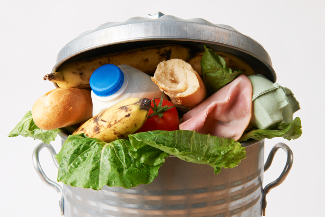Member State Page : Croatia
Last updated on the 29/09/2023

Per capita: 71 kilos in 2020
In total: 286.379 tonnes of food waste in 2020
In total: 280 008 tonnes of food waste in 2021

In 2020
Primary production: 14%
Processing and manufacturing: 3%
Retail and other distribution of food: 2%
Restaurants and food services:5%
Households: 76%

National target: contribution to the realization of the goals set out in the UN 2030 Agenda for Sustainable Development, specifically of SDG 12.3., and to reduce food waste by 30% by 2028
Target
Croatia is committed to meeting the Sustainable Development Goal Target 12.3 to halve per capita food waste at the retail and consumer level by 2030 and reduce food losses along the food production and supply chains, as part of its national food waste prevention and reduction plan.
The objective of the new Plan for food waste prevention and reduction 2023-2028 is to contribute to the realization of the goals set out in the UN 2030 Agenda for Sustainable Development, specifically of SDG 12.3. and to reduce food waste by 30% by 2028.
Measure
The latest statistical data show that in Croatia 286.379 tons of food waste is generated annually, which is 71 kg per capita. Households generated 76 % of the total amount, which is 216,345 tons or 54 kg per capita while the business sector generated 70.073 tons, which is 24 % or 17 kg per capita. Inedible, unavoidable part of total amount is 180.342 tons or 63 %, but edible, avoidable part is 106.037 tons or 37 %. The research project included a survey of over 1,000 households and about 2,000 units in the business sector, and Family farms were also included.
Previously, data on national food waste levels were extracted from the Environmental Pollution Register (EPR), database laid down by the Environmental Protection Act (OG 80/13, 153/13, 78/15, 12/18, 118/18). EPR contains annual data on waste amounts generated, collected and treated. According to the Ordinance on Environmental Pollution Register (OG 87/15), food business operators and other actors that produce annually more than 500 kilos of hazardous waste and/or more than 20 tonnes of non-hazardous waste are obliged to report annual data to EPR. Additionally, all waste collectors and waste treatment companies are obliged to report annual data to the above-mentioned database. Competent authorities then check the data received to ensure their completeness, consistency and credibility. MoESD coordinates activities relating to data quality assurance and control.
Through annual data collection according to the waste legislation related to by-products and the end of waste status, MoESD monitors the quantities of food waste that have been avoided.
In 2018, within the project ‘Improving the system for collecting data on bio-waste and food waste’ conducted by MoESD, a rough estimation of food waste amounts has been made according to the common EU food waste measurement methodology.
Act
The Government of the Republic of Croatia adopted a Food waste prevention and reduction Plan (2019 – 2022) in 2019, together with an accompanying program for its implementation. The objective of the Plan was to contribute to the realisation of the goals set out in the EU and United Nations’ 2030 Agenda for Sustainable Development (SDG), specifically of SDG 12.3.
In December 2022 Government of the Republic of Croatia adopted the second national Plan for food waste prevention and reduction for the period 2023-2028, which is based on the results and implementation data from the previous Plan. The new Plan contains six measures as continuation of the measures from previous Food waste prevention and reduction Plan (2019 – 2022) but supplemented with additional activities. The total investment for all measures planned in period 2023-2028 amounts to 5.734.953 EUR.
Specific food waste prevention measures include:
· encouraging and further improving the food donation system in the Republic of Croatia
· encouraging the reduction of food waste generation
· promotion of social responsibility in the food sector
· raising awareness and informing consumers about the prevention and reduction of food waste
· monitoring the quantities of food waste
· investing in research work and innovative solutions that contribute to the prevention and reduction of food waste
Encouraging food donation is one of the most important measures in national food waste prevention Plan. Rules on donation of food and feed are stipulated in the Agriculture Act (O.G. 118/18, 42/20, 127/20, 52/21 and 152/22) and in the Ordinance on food and feed donation (O.G. 91/19). The legal framework for food donation has been improved to reduce administrative burdens for food business operators, to allow the donation of food products until the end of their ‘use by’ date and after the expiry of their ‘best before’ date if still safe for human consumption. Workshops were held with food business operators in order to clarify the legal food safety requirements in relation to food donation and to encourage them to join the food donation system. Based on the EU Food Donation Guidelines, Croatia has developed similar guidelines at national level in 2019. In addition, the latest activities include the implementation of a measure to improve food donation system as part of National Recovery and Resilience Plan.
Since 2015, there have been tax incentives for food donations: VAT is not imposed on donations of foods close to their expiration date, nor for foods that could not be placed on the market (for other reasons than food safety considerations). Also, if made under certain conditions, donations from profit tax payers are tax deductible and income tax payers can also benefit from a tax deduction on food donations. Furthermore, the Ministry of Agriculture launched an IT system to facilitate food redistribution, which improves the communication between donors and charities. IT system for food donation (e-donation) was upgraded in 2022. Moreover, a Food Bank Feasibility Study was conducted.
Several activities and informative materials have been organised and developed in order to raise consumers’ awareness on the food waste issue: a video explaining the difference between date markings, a brochure ‘Understanding food information and consumer attitudes about food waste’, a short animated film to encourage consumers to use surplus food, a consumer campaign (2020) under the slogan ‘Eat and share! #Food is not waste!’ etc. Tips for reducing food waste are usually published before the holidays on the website of the Ministry of Agriculture. Furthermore, in cooperation with cooking schools, the Ministry of Agriculture has published a booklet of recipes for preparing dishes from surplus food. All these projects are accompanied with TV and radio campaigns during holiday season aimed at raising awareness among consumers.
On the occasion of the IDAFLW, an exhibition "Food is not a waste, I can influence!!" was held in two cities, 2021 in Zagreb and 2022 in Velika Gorica.
In line with the national food waste prevention Plan, the curricula for pre-school, primary and secondary education include topics such as sustainable development, civic education and health, which cover food waste aspects.
Since 2013, Croatia has been implementing the school scheme for primary and secondary school students to promote healthy eating habits and to increase the share of fruits and vegetables, milk and dairy products in pupils’ daily diet. Food waste prevention is one of the topics included as part of additional educational measures in the context of the scheme.
In line with the food waste reduction and prevention plan, the Ministry of Agriculture in 2021 has published four sectorial guidelines: for the retail sector, for hospitality and institutional kitchens for primary production and for the food processing sector.
MoESD has developed and maintains the Waste Prevention Portal, which contains general information related to waste prevention and prescribed waste prevention measures. Among the other it provides basic information on ways to prevent bio-waste and to reduce food waste as well as examples of food waste prevention activities conducted by local self-governing entities and companies.
Additionally, the internet Platform[1] for prevention and reduction of food waste, as a unique place for the exchange of knowledge and good business practices, was launched by Ministry of Agriculture in June 2022.
On March 23, 2023, a voluntary agreement on the prevention and reduction of food waste, which is an important activity of the Plan for the prevention and reduction of food waste, was signed. The agreement was signed by the Ministry of Agriculture of the Republic of Croatia and representatives of food producers and processors, trade sector, hospitality sector, the scientific and academic community, local and regional self-government units, non-profit organizations and initiatives, as well as associations and companies. The agreement currently has 45 signatories and during its duration of five years it is available for accession by new signatories.
